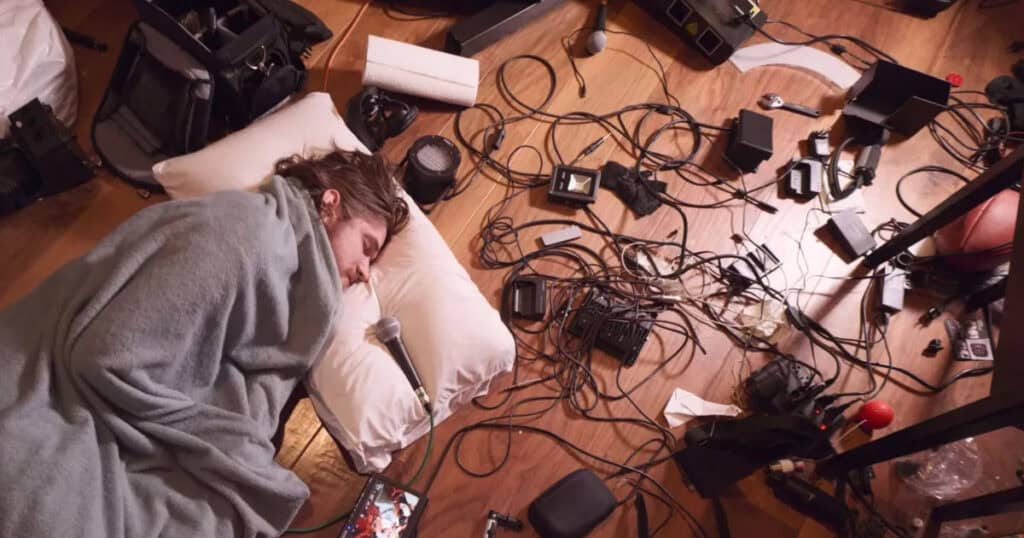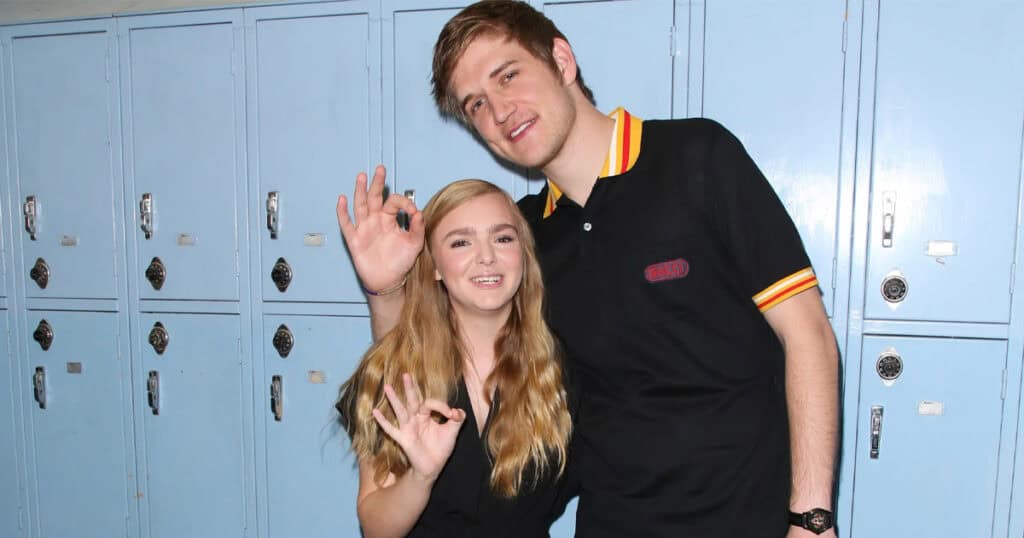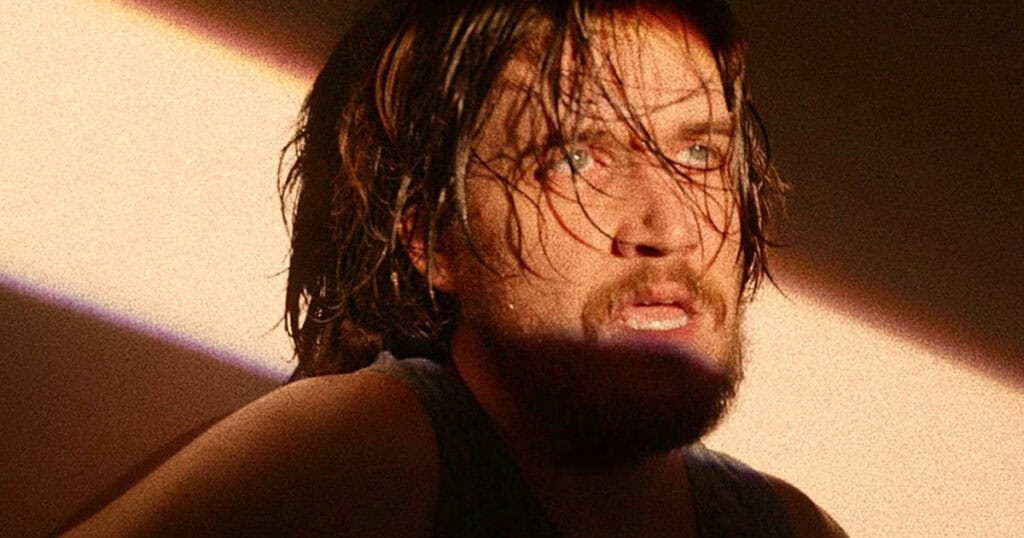
Bo Burnham considers himself underqualified to grant anyone else the keys to success. “I would say don’t take advice from people like me who have gotten very lucky. We’re very biased. You know, like Taylor Swift telling you to follow your dreams is like a lottery winner telling you, ‘Liquidize your assets; buy Powerball tickets – it works!’”
The proverb “Luck is what happens when preparation meets opportunity” is most commonly attributed to the Roman philosopher Seneca. Canadian economist Stephen Leacock wrote in 1914 “I am a great believer in luck. The harder I work, the more of it I seem to have.” So how did Bo Burnham’s preparation, hard work, opportunity, and luck begin? To know that, we must go back to the beginning, where the beginning began, when he was born Robert Pickering Burnham on August 21st, 1990, in Hamilton, Massachusetts. Growing up in a Catholic family, Bo was raised by his parents, Patricia and Scott Burnham, a hospice nurse and a construction company owner, respectively.
Bo’s early life was marked by a passion for comedy and music. He began writing songs and performing stand-up comedy in high school, and despite in-character moments alluding to discouragement from his parents throughout his works, his parents encouraged and supported his creative pursuits. After graduating from St. John’s Preparatory School in 2008, Bo decided to pursue a career in comedy instead of attending college, although he was accepted into Brown, Harvard, and NYU.
Before his YouTube fame, Bo performed at local comedy clubs and open mic nights, honing his skills and developing his unique blend of humor and music. In 2006, he created his YouTube channel, which would eventually launch him to stardom.

Bo Burnham’s meteoric rise began when the precocious 16-year-old started gaining viral traction by uploading darkly humorous, intentionally controversial comedy songs that he wrote and performed from his childhood bedroom in Massachusetts. Early flashes of infamy like My Whole Family Thinks I’m Gay showcased Burnham’s preternatural flair for provocative satire and skill at juxtaposing searing social commentary against deceptively juvenile songcraft.
While Burnham has since expressed some regret over the mean-spirited, boundary-demolishing nature of those teenage YouTube uploads that frequently punched down at marginalized groups, there’s no denying they tapped into a defiant, anti-establishment spirit resonating with the website’s predominant user-base of fellow disaffected youth. The Massachusetts teen’s willingness to pour gasoline on society’s most combustible tensions struck a nerve, as did the contrast between his cherubic persona and mordant subject matter.
At a time when YouTube was still a true democratized platform giving anybody with a webcam the opportunity to become a star rather than the heavily corporatized, commercially sanitized product pipeline it is today, Burnham quickly amassed millions of fans drawn to his anarchic worldview. The newly-minted internet phenomenon soon achieved the dream of many a bedroom content creator – becoming the target of a high-powered Hollywood bidding war. In 2008, Comedy Central won out, signing the erstwhile high school student to a lucrative multi-platform development deal.
Burnham made the unprecedented leap to becoming the youngest performer in history to record a televised half-hour Comedy Central special at just 18 years old. His precociousness and ability to seamlessly blend disarming musical talent with incendiary cultural criticisms was on full display on his first two albums for the network – 2009’s Bo Burnham and 2010’s Words Words Words. While courting constant controversy by satirizing taboo topics like race, religion, and sexuality through the lens of unrepentant male adolescent id, Burnham was quietly beginning to exhibit grander artistic ambitions that would reshape the boundaries of contemporary comedy.
His Words Words Words special featured cunningly choreographed multimedia production elements that hinted at Burnham’s visionary penchant for innovating far beyond the conventional comedy stage. The young firebrand was both profiting off cheerful violations of modern decency and propriety while laying the groundwork to utterly demolish the tired conventional wisdom about a standup comedian’s role and canvas. He would spend the next decade in a heroic and constantly evolving campaign to completely redefine the very notion of just what a “comedy special” could be and contain.

That metamorphosis accelerated with Burnham’s audacious 2013 Netflix special What?, which found him shedding the final creative restrictions and fully embracing a deconstructed, avant-garde style that presaged the bold ambitions that would become his brand. Beginning to grapple with neo-existentialist themes of modern alienation and despair, the essence of What? nevertheless retained his signature ability to explore profound exasperation through the paradoxical lightness of sublime musical satire. Even as he methodically deconstructed and ridiculed society’s most deeply held assumptions, he could still command laughter through sophisticated long-game misdirection and manipulation of tone and cadence.
Around this prolific pivot toward a more conceptual, boundary-obliterating comedic style, Burnham fired his first narrative salvo at the cultural depravities of the social media generation by creating, writing, and starring in 2013’s MTV sitcom satire Zach Stone Is Gonna Be Famous. The series was a disquieting harbinger of Burnham’s ever-prescient facility for cutting straight to the social malignancies underpinning the 21st century’s most pervasive ills. Viewed in retrospect, the show’s depiction of a hopelessly fame-obsessed teenager tearing down every conceivable boundary to fuel his narcissistic delusions feels ahead of its time in dissecting the pernicious effects of the burgeoning influencer economy. While the series only lasted a single season, it marked the arrival of Burnham as a potent satirical voice moving beyond juvenile shock value and into scathing cultural commentary about social media, celebrity, and the fracturing of identity in a hyperconnected digital hellscape.
Bo Burnham made memorable appearances on sketch comedy shows The Kroll Show and Key and Peele in 2015. He continued widening his thematic scope while pushing the medium of stand-up multimedia even further with his daring 2016 Netflix special Make Happy. An iconoclastic blend of exquisite choreography, tonal whiplash, and confrontational metatheatrics, Make Happy deconstructs the entire notion of comedy as a night of straightforward escapist laughs. Instead, Burnham uses joke-telling as a smokescreen to smuggle in an imperious attack on the entire entertainment industry, the emptiness at the heart of fame, and the hollow superficialities that propel our societal obsession with figures who are, put simply, “lying and manipulating you.”
Watching Burnham shift between irreverent Pryor-esque ruminations on race and more psychologically harrowing passages where he seems to be giving himself over fully to the undertow of depression and despondency makes for a constant refutation of the viewer’s established expectations. Make Happy foreshadows the breakdown of formal boundaries between creator and consumer that will reach its disorienting apex in Burnham’s later works as he dissolves the fourth wall altogether and turns the lens fully inward in a revolutionary act of candor and unflinching public therapy.

The psychic toll of conjuring such a thematically and structurally labyrinthine work as Make Happy, combined with Burnham’s frank disclosure that he had secretly been battling trauma from years of unrelenting cyber harassment, eventually caught up to him. In the immediate aftermath, he found himself in the grips of a mental health crisis, suffering from depersonalization and a complete inability to engage with day-to-day existence, describing the feeling as “barely coming out of my breath.” These bouts of dissociation and panic led to some nightmarish live performances where Burnham seemed to fully unravel on stage in full public view.
Wisely recognizing the hazards to his well-being, Burnham made the self-preserving decision to step away from stage performances for a half-decade sabbatical to recalibrate and pursue other creative outlets. In his own words, “I’d love to do something that doesn’t have my stupid face in front of it. I feel like I’ve exhausted what I can do with my own face.” He expanded his repertoire by directing comedy specials for fellow standups like Chris Rock, Jerrod Carmichael, and Kate Berlant while moonlighting in various minor acting roles that allowed him to maintain creative fulfillment without the psychological hazards of constantly having to mine his own turbulent interior for content.
The hiatus paid dividends, as Burnham’s next major artistic statement saw him broadening into yet another new medium as the writer/director of the 2018 indie coming-of-age drama Eighth Grade. An exquisitely empathetic excavation of adolescent awkwardness and ennui in the social media age, the film cemented Burnham’s reputation as a modern-day philosopher uniquely attuned to the specific anxieties induced by a hyper-connected reality where human interaction is constantly mediated through the artifice of digital avatars and identities. Eighth Grade generated rapturous reviews and is considered one of the seminal cinematic time capsules of contemporary teenage life, owing to Burnham’s fidelity in recreating the suffocating hyper-reality of how young people now experience each minor hiccup of everyday social interaction as a life-or-death emotional melodrama. Bo Burnham played the role of Ryan Cooper in the 2020 film Promising Young Woman. His performance was praised for his emotional range and chemistry with the other characters.
While Eighth Grade showcased Burnham’s ability to engineer poignant pathos regarding the malaise afflicting the social media generation, he ultimately reserved his most eviscerating critique of society’s troubling cyber-obsession for himself. That arrived via his 2021 Netflix masterpiece Inside – a wildly ambitious, reality-refracting comedic omnibus of avant-garde experimentation, soul-shredding folk confessionals, confrontational anti-comedy and musical theatre extravaganzas that together represent a wholesale redefinition of what a standup “special” can contain and accomplish.
Filmed entirely solo by Burnham with no crew or audience during the surreal psychic reorientation of the Covid-19 quarantine period, Inside stands as a brilliant, intermittently harrowing, multi-disciplinary work of artistic stamina and creative wizardry. From a purely technical perspective, every frame of Inside showcases Burnham’s boundless visual talents and mastery of production design fundamentals like cinematography, lighting, camera choreography and editing that allows the special to constantly disorient the viewer’s grounding in objectivity and space. Musically, Inside contains some of Burnham’s most powerful work – from the wry, rapped satirical takedowns mourning the exhausting panopticon of social media content creation in tracks like “Welcome to the Internet” to the soulful, existential folk confessions exploring pandemic-era malaise and millennial ennui in “That Funny Feeling.”
But where Inside truly transcends is its searing philosophical depth probing what it means to be alive in the current age of ubiquitous digital over-stimulation, excessive self-monitoring, and fractured identities rooted more in social media avatars than flesh-and-blood existence. No other artist is better capturing the surreal absurdities of modern life quite like Burnham.
Songs like the satirical anthem “Welcome to the Internet” revel in the endless buffet of content competing for our eyeballs, while the haunting folk track “That Funny Feeling” lays bare the profound emptiness and self-revulsion that arises when we inevitably emerge from our screen-induced dopamine trances. No matter how euphoric Instagram perfection makes us feel in the moment, Burnham suggests, that high will always give way to the same sinking loneliness and purposelessness.
Nowhere is Inside‘s core tension between the real and performative self more apparent than its mind-bending finale, where Burnham emerges from the guest house into a Las Vegas revue spotlight, leaving the viewer to wonder if the preceding hour was a wrenching mental breakdown captured candidly or the most meta extension of the entire special’s overarching themes about modern life as one never-ending performative act.
Bo Burnham, still just 33 years old, has rapidly evolved from irreverent YouTube phenom to trailblazer expanding the boundaries of multimedia art, prophetic cultural critic, and an insightful philosopher dissecting modern humanity’s deeply troubling cyber-age malaise. Few artists are excavating the complexities and tragedies of the internet brain quite like Burnham, who emerged from the same digital content mines he’s now brilliantly critiquing and transcending. After being largely out of the spotlight since releasing The Inside Outtakes in 2022, Burnham is slated to star in and write music for the upcoming Sesame Street movie. He won’t be Big Bird, though he’s certainly tall enough. He is also set to produce an anti-bully narrative feature starring Jaboukie Young-White that was once titled Gay Kid and Fat Chick. I don’t know if that title will stick.
As Burnham continues redefining the possibilities of comedy, music, filmmaking and multimedia art to cut to the core of 21st century existence, he cements himself as perhaps the definitive artistic voice of the internet age – the first true Renaissance talent to emerge natively from the digital ether and use it as raw material to create penetrating capital-A Art about life in late capitalist cyber-reality. We are all trapped inside now, in a way, and Bo Burnham has built himself a sprawling guest house in this existential purgatory to document the journey.
The post What Happened to Bo Burnham? appeared first on JoBlo.
Leave a Reply